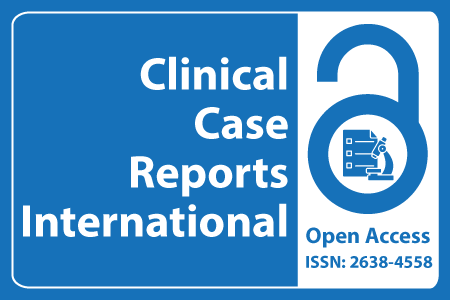
Journal Basic Info
- Impact Factor: 0.285**
- H-Index: 6
- ISSN: 2638-4558
- DOI: 10.25107/2638-4558
Major Scope
- Food Science
- Neonatology
- Physical Medicine & Rehabilitation
- Hepatology
- Tuberculosis
- Molecular Biology
- Lung Cancer
- Pulmonary Disease
Abstract
Citation: Clin Case Rep Int. 2024;8(1):1670.DOI: 10.25107/2638-4558.1670
Enhancing Infectious Disease Management in Nigeria: The Role of Artificial Intelligence in Diagnosis and Treatment
Ajayi OO, Wright-Ajayi B, Mosaku LA, Davies GK, Moneke KC, Adeleke OR, Shaba DS and Mudele O
Department of Sustainability and Social Justice, Clark University, USA
Ireti Resource Center, Programs Section, Women’s Rights and Health Project (WRAHP), Nigeria
School of Public Health, University of Illinois at Springfield, USA
Department of Nutrition, Harvard University, USA
*Correspondance to: Oluwole Olakunle Ajayi
PDF Full Text Review Article | Open Access
Abstract:
Infectious diseases present major obstacles to global public health systems, especially in resourcepoor areas like Nigeria. Artificial Intelligence (AI) methods for disease detection, medication development, and patient risk assessment are widely used in healthcare. In the low-resource setting like what Nigeria represents, the benefits of AI in offsetting major systemic and resource constraints cannot be overemphasized. In light of the recent strides by the Nigerian government to support local AI adoption and talent development, we present an overview of how public and private health management and delivery practitioners should being to think about adopting AI technologies to improve health services delivery within the country, especially towards managing infectious diseases. Our overview is based on a mixture of on-the ground experience and literature studies. With the evidence in literature showing that AI shows great promise for enhancing clinical laboratory testing, disease diagnosis, and treatment selection, we have argued that by prioritizing AI integration into health systems in Nigeria, there will be higher accuracy in diagnoses, lower costs of service provision, and time savings to ensure the understaffed health systems can reach more people.
Keywords:
Infectious disease; Nigeria; Machine learning; Artificial intelligence
Cite the Article:
Ajayi OO, Wright-Ajayi B, Mosaku LA, Davies GK, Moneke KC, Adeleke OR, et al. Enhancing Infectious Disease Management in Nigeria: The Role of Artificial Intelligence in Diagnosis and Treatment. Clin Case Rep Int. 2024; 8: 1670.













